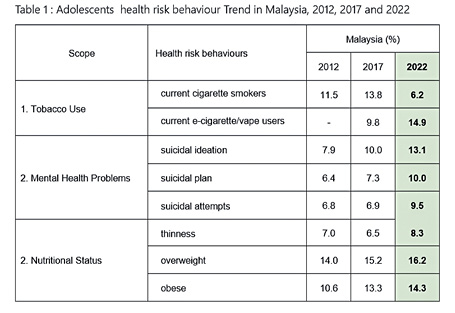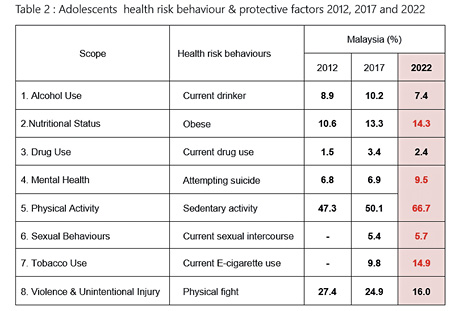The Ministry of Health (MoH) provides access to comprehensive, quality healthcare services through its nationwide network of healthcare facilities (hospitals, health clinics and rural clinics) for all age groups, including adolescent girls and boys.
It provides integrated, comprehensive Adolescent Health Services (AHS) as an expanded Family Health Development Division scope in all primary health clinics nationwide.
Adolescent services include promotive, preventive, curative and rehabilitative services covering five major scopes: physical health, nutritional health, mental health, risky behaviour and sexual reproductive health. A referral system was established for multidisciplinary interventions where necessary.
 AHS is provided to all age groups without discrimination of gender, ethnicity, marital status, socio-cultural or religious background, guided by national guidelines, laws and regulations. AHS is integrated into all primary healthcare facilities nationwide via static and mobile outreach services.
AHS is provided to all age groups without discrimination of gender, ethnicity, marital status, socio-cultural or religious background, guided by national guidelines, laws and regulations. AHS is integrated into all primary healthcare facilities nationwide via static and mobile outreach services.
Best Practice Adolescent Friendly Health Services (AFHS) is one of the MoH’s initiatives to increase health workers’ visibility, commitment and focus on adolescent health. Healthcare providers are trained in line with the World Health Organisation (WHO) criteria and SOPs developed by the MoH Malaysia.
The importance of adolescent health and friendly health services are emphasised among health personnel towards a whole clinic approach to enhance awareness of adolescent health and ultimately to reduce morbidity and mortality among adolescents in the operational area.
In tackling adolescent health issues that are complex and sensitive, healthcare providers are regularly trained in the management of adolescent health, creating awareness to prevent stigma, and implementing professionalism, confidentiality, and non-judgmental with “the best interests of the child” as a primary consideration.

The MoH, in collaboration with various agencies, such as the Ministry of Women, Family and Community Development (MWFCD), Ministry of Education (MOE) and NGOs, provides continuous advocacy at the clinic, school and community
levels.
Community empowerment and mobilisation of civil societies and religious leaders for addressing adolescent health issues at the grassroots were also conducted. Budget allocation is essential to support the expansion and sustainability of programmes/ human resources/training for health workers etc. – The Health








